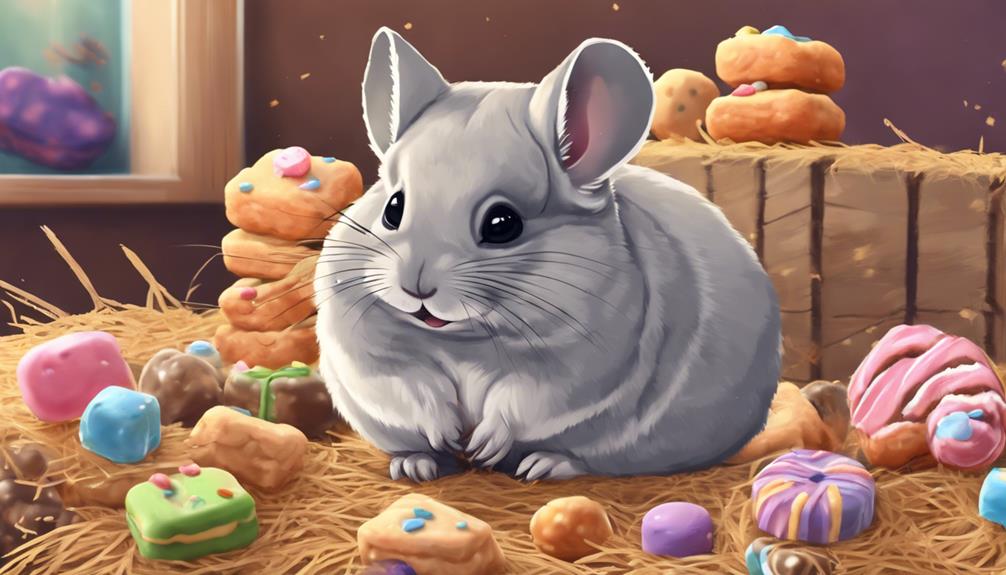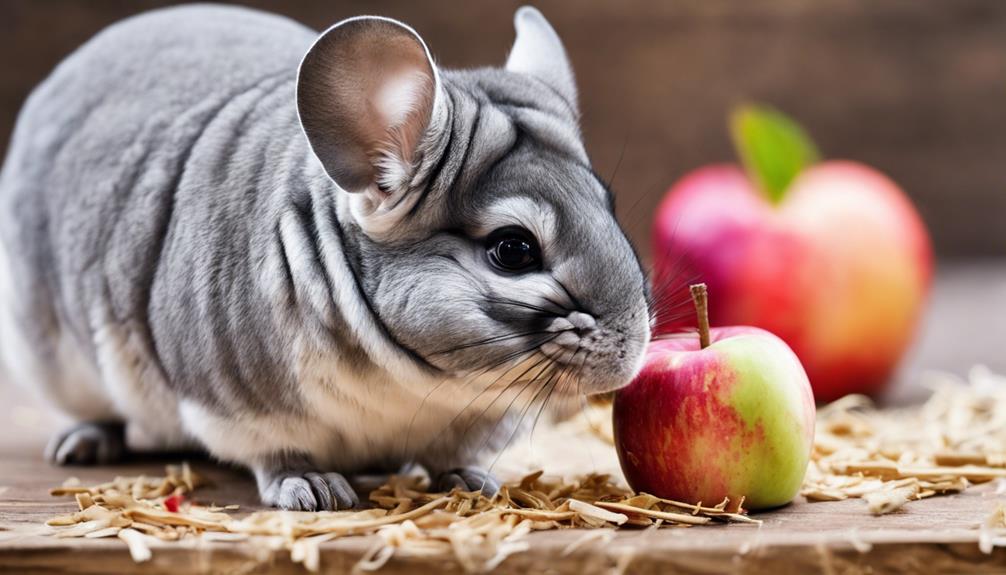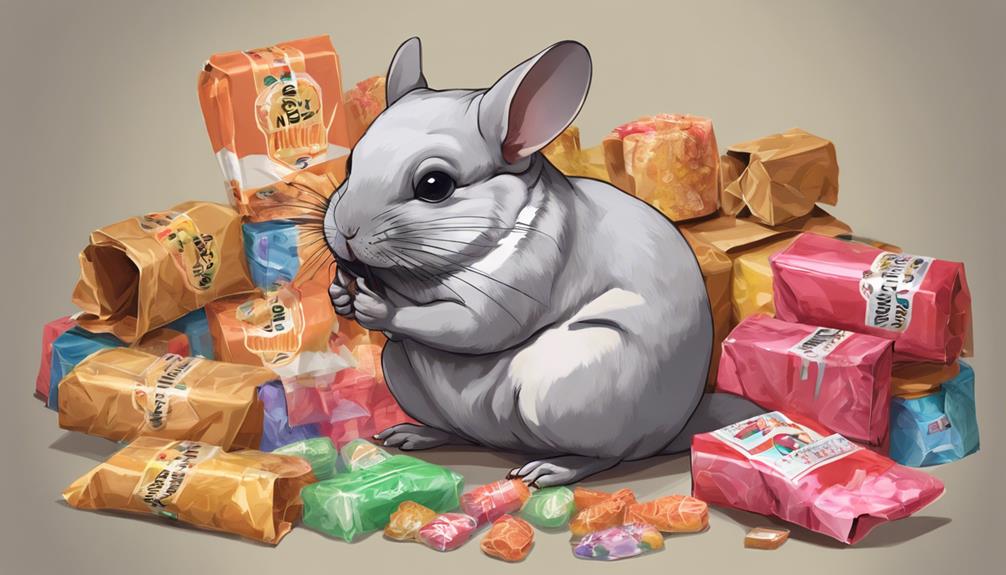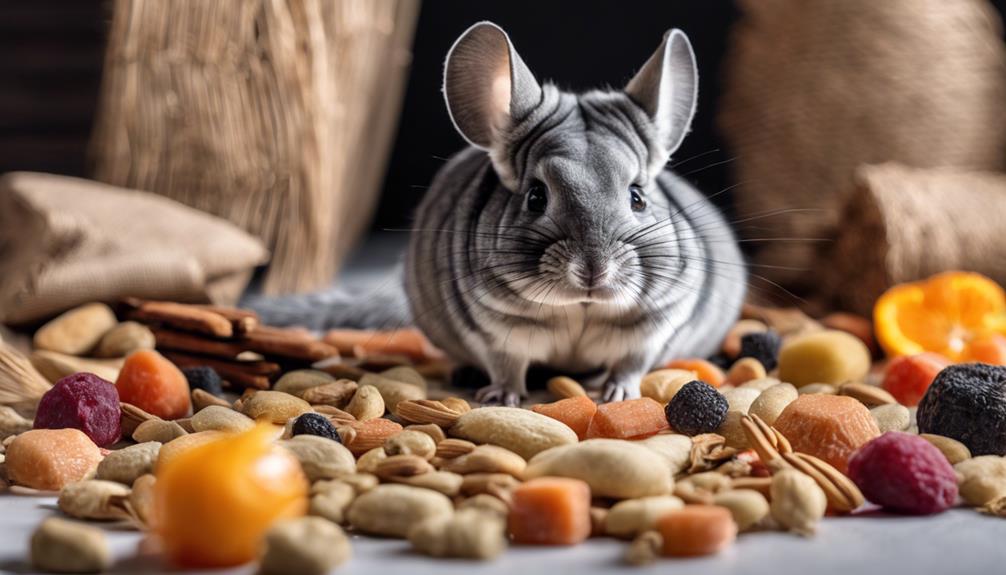How Treats Can Affect Your Chinchilla's Health: What to Know

Chinchillas are adorable and friendly pets that require a specific diet to stay healthy. Their digestive systems are delicate and can be easily upset by the wrong foods. One area of concern for chinchilla owners is the use of treats in their diet. While treats can be a fun way to bond with your pet and provide enrichment, they should be given sparingly to avoid health issues. Overfeeding treats can lead to obesity, dental problems, and digestive issues in chinchillas. It is important to strike a balance between providing treats for your chinchilla and ensuring that the majority of their diet consists of hay, pellets, and fresh water. By monitoring your chinchilla's treat intake and choosing healthy options, you can help them maintain their health and well-being.
Chinchilla treats should be given in small quantities and limited to a few times a week. Avoid treats high in sugar, fat, or artificial ingredients, as these can cause more harm than good. Instead, opt for natural, chinchilla-safe treats like dried fruits or herbs. Always check with your veterinarian before introducing any new treats to your chinchilla's diet to ensure they are safe and appropriate. With careful attention to your chinchilla's diet and treat intake, you can help them live a long, happy, and healthy life.
Chinchilla Diet Basics
When considering chinchilla diet basics, prioritize a balanced mix of hay, pellets, and fresh water for best health and well-being. Nutritional balance is key to ensuring your chinchilla thrives.
Hay should make up the majority of their diet, providing essential fiber content for proper digestion. Select good quality hay, such as timothy hay, to meet their dietary needs.
Alongside hay, offer pellets specifically formulated for chinchillas to supplement their nutritional requirements. These pellets are designed to provide essential vitamins and minerals necessary for their well-being.
Fresh water is equally important for your chinchilla's health. Make sure they have a clean and accessible source of water at all times. Hydration is critical for their overall health and aids in digestion.
Common Treat Pitfalls
Watch out for common treat pitfalls when caring for your chinchilla.
Avoid sugar-laden treats that can negatively impact their health and be mindful of the risks of overfeeding.
Keeping these points in mind will help maintain your chinchilla's well-being and happiness.
Sugar-Laden Treats
Indulging your chinchilla with sugar-laden treats can have detrimental effects on their health and well-being. High sugar intake not only poses risks to your chinchilla's dental health but can also lead to weight gain, affecting their overall wellness.
Chinchillas have sensitive digestive systems, and excessive sugar can disrupt their balance. To maintain their health, opt for healthier treat alternatives like hay-based snacks or occasional pieces of dried fruits.
Monitoring your chinchilla's diet is key to preventing health issues down the line. Remember, a well-rounded diet coupled with a suitable exercise routine is crucial for your chinchilla's happiness and longevity. Prioritize their well-being by making informed choices when it comes to their treats.
Overfeeding Risks
To guarantee your chinchilla's well-being, be mindful of the risks of overfeeding, especially when it comes to common treat pitfalls. Proper portion management is key to maintaining your pet's weight control and overall health. Here are some common treat pitfalls to watch out for:
| Treat Pitfall | Description |
|---|---|
| High-Calorie Treats | These treats can lead to weight gain if given excessively. |
| Sugary Treats | Excessive sugar intake can cause digestive issues and obesity. |
| Treat Substitutes | Some treats marketed as healthy alternatives may still be high in calories. |
Ideal Treat Options

For best chinchilla health, prioritize incorporating nutritious treats into their diet.
When choosing treats for your furry friend, opt for options that not only satisfy their taste buds but also provide essential nutrients.
Nutritious snacks like dried rose hips, plain cheerios, or small pieces of dried apple can be safe indulgences that offer a blend of flavor and health benefits.
These treats can serve as a source of enrichment for your chinchilla, promoting mental stimulation and overall well-being.
Portion Control Guidelines
Optimizing your chinchilla's health also involves carefully monitoring their treat intake to guarantee they maintain a balanced diet. When it comes to portion control guidelines for your chinchilla's treats, keeping a few key points in mind can make a significant difference in their overall well-being:
- Snack Size: Opt for small, bite-sized treats to make sure your chinchilla gets a tasty reward without consuming excessive calories.
- Moderation Key: Remember that moderation is important when it comes to treating your chinchilla. Limit the number of treats given per day to avoid nutritional imbalances.
- Balanced Diet: Treats should complement your chinchilla's main diet, not replace it. Make sure that the treats provided are in addition to a well-rounded and nutritionally complete chinchilla food.
Signs of Treat Overindulgence

You've pampered your chinchilla with treats, but it's important to be aware of the signs of overindulgence. Excessive treat consumption can lead to negative health impacts that may affect your chinchilla's well-being.
Keep a watchful eye for any subtle changes in behavior or physical symptoms that could indicate your furry friend has had one too many treats.
Excessive Treat Consumption
Indulging your chinchilla excessively in treats can lead to various health issues that shouldn't be overlooked. Remember, treat moderation is of utmost importance to maintain your little one's well-being.
Here are signs of treat overindulgence to watch out for:
- Obesity: Excessive treats can cause your chinchilla to gain weight rapidly, leading to obesity.
- Digestive Problems: Overconsumption of treats can disrupt your chinchilla's digestive system, causing issues like diarrhea or constipation.
- Dental Concerns: Too many sugary or sticky treats can result in dental problems for your chinchilla, affecting their dental health.
Always prioritize your chinchilla's health by offering treats in moderation to prevent these health consequences.
Negative Health Impacts
Overindulging your chinchilla in treats can have detrimental effects on their health if not monitored carefully. Weight management is important for chinchillas, as excessive treats can lead to obesity and related health issues. Keep an eye out for signs of weight gain such as a rounder appearance or difficulty moving.
Dental care is another aspect impacted by treat overindulgence. Treats high in sugar or low in fiber can contribute to dental problems like overgrown teeth or dental decay. To prevent these issues, make sure treats are given in moderation and choose options that support your chinchilla's overall health.
Healthy Treat Alternatives
For best chinchilla health, incorporating healthy treat alternatives into their diet periodically can help secure a balanced nutritional intake. When choosing treats for your chinchilla, opt for nutritious snacks and healthy rewards to keep them happy and healthy.
Here are three healthy treat alternatives to contemplate:
- Timothy Hay Cubes: These fiber-rich cubes aren't only great for your chinchilla's dental health but also provide essential nutrients for their well-being.
- Rosehips: Rich in Vitamin C, rosehips are a tasty and healthy treat option that can support your chinchilla's immune system and overall health.
- Dried Herbs: Chinchillas love the taste of dried herbs like parsley, cilantro, and basil. These herbs not only add variety to their diet but also offer additional nutrients and antioxidants.
Balancing Treats With Nutrition

When selecting treats for your chinchilla, remember to maintain a balance that complements their nutritional needs to guarantee overall health and well-being. Nutrient balance is key, ensuring that treats aren't just indulgent but also contribute positively to your pet's diet.
It's important to practice indulgence control, offering treats in moderation to prevent any adverse health implications. Dietary moderation is a vital aspect to take into account when pampering your chinchilla with treats.
Too much of a good thing can lead to imbalances in their diet, potentially affecting their health in the long run.
Frequently Asked Questions
Can Chinchillas Eat Human Food as Treats?
Chinchillas can enjoy human food as treats, but focus on nutritional balance and portion control. Be mindful of ingredients and moderation. Treats are a fun addition, but always prioritize your chinchilla's well-being.
Are There Any Specific Treats That Can Help With Dental Health for Chinchillas?
To maintain good dental hygiene for your chinchilla, consider treat options like timothy hay-based treats or wooden chew sticks. These can help wear down their teeth naturally, promoting oral health and preventing potential dental issues.
How Often Should Treats Be Given to Chinchillas?
You should give treats to your chinchilla sparingly. Consider their weight; a general rule is 1-2 treats weekly. Vary treats to include fruits, veggies, and chinchilla-safe options. Remember, moderation is key for a healthy diet.
Can Treats Be Used as a Training Tool for Chinchillas?
Yes, treats can be used as a valuable tool for chinchilla training. By offering treat rewards strategically, you can reinforce positive behaviors and create a strong bond with your chinchilla through positive reinforcement in their behavioral training.
Are There Any Specific Treats That Can Help With Chinchilla Digestion or Gut Health?
For chinchilla digestion and gut health, opt for treats high in fiber and low in sugar. Consider adding probiotic supplements or digestive enzymes to support their well-being. Remember, a healthy tummy means a happy chinchilla.











